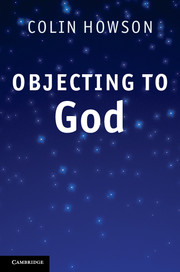Book contents
- Frontmatter
- Contents
- Preface
- Acknowledgments
- Chapter 1 Of human bondage
- Chapter 2 God unlimited
- Chapter 3 How to reason if you must
- Chapter 4 The well-tempered universe
- Chapter 5 What does it all mean?
- Chapter 6 Moral equilibrium
- Chapter 7 What is life without Thee?
- Chapter 8 It necessarily ain't so
- Bibliography
- Index
- References
Chapter 2 - God unlimited
Published online by Cambridge University Press: 05 June 2012
- Frontmatter
- Contents
- Preface
- Acknowledgments
- Chapter 1 Of human bondage
- Chapter 2 God unlimited
- Chapter 3 How to reason if you must
- Chapter 4 The well-tempered universe
- Chapter 5 What does it all mean?
- Chapter 6 Moral equilibrium
- Chapter 7 What is life without Thee?
- Chapter 8 It necessarily ain't so
- Bibliography
- Index
- References
Summary
‘Blessed are they who have not seen, and yet have believed.’
Rock(s) of ages
One of Richard Dawkins's most illuminating insights was to identify what he called memes as a key explanatory variable in the evolution of ideas, giving them the same sort of role in cultural evolution as genes play in the evolution of biological traits: we are vectors of memes just as we are vectors of genes. From that it is a quick inference, unsurprisingly made in a characteristically trenchant way by Dawkins himself, and then developed at length by Susan Blackmore, to see religion as a sort of memetic virus. Not only do the Abrahamic religions enjoin breeding and the inculcation of the same faith in their offspring, but as Blackmore emphasised, they also embody a very efficient self-protective mechanism in elevating faith above evidence, and the possession of faith into a prime virtue. Faith, as St Paul reminded the Hebrews, is ‘the substance of things hoped for, the evidence of things not seen’. ‘The evidence of things not seen.’ This arresting phrase is approvingly quoted time and again, as if its beauty excuses what in fact is simply oxymoronic sophistry. Should you believe in fairies because you don't see them? But now comes the real coup. The corollary of elevating faith into a supreme virtue is that the desire for what ordinary people might think of as evidence to justify religious belief – reliable eye-witnesses and so forth – becomes a corresponding vice. And so we have the scene set for a nice Catch 22: a request for evidence is to display doubt, which is to lack faith, which is, as St Paul was at pains to make clearly understood, to be sinful. ‘Whatsoever is not of faith, is sin’, he told the Romans.
- Type
- Chapter
- Information
- Objecting to God , pp. 35 - 63Publisher: Cambridge University PressPrint publication year: 2011

